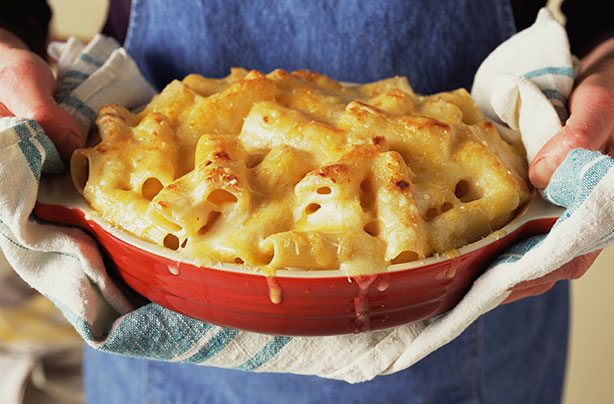Cheese lovers, rejoice: Here are 6 reasons why CHEESE is actually good for you
Grate news for fans of a cheeseboard...


From pizza and pasta to crackers and chutney, we've never really found a dish that a sprinkle (read: slab) of cheese doesn't improve.
In the past, we've tried to keep our intake of cheese to a minimum, because of its frequently high fat and salt content, and somewhat scary calorie count, but now we'll be cracking out the cheeseboard with abandon, because it turns out that cheese could be healthy - no, really!
We've rounded up six proper scientific reasons that show that a little bit of what you fancy (in our case, a mountain of Cheddar) can actually do you a world of good. And if that means we get to chow down on a baked Brie or a stack of halloumi on a much more regular basis, it can only be grate news...
1. It can protect your heart
In September 2016, researchers in Copenhagen found that cheese increases your levels of a high-density cholesterol, which can protect against certain diseases - including cardiovascular problems.
They conducted a 12-week cheese test with 139 adults to discover how full-fat cheese can affect the body, and found that those who ate cheese regularly had increased 'good' high-density lipoprotein (HDL) cholesterol - a type of cholesterol that is thought to protect your ticker.
2. It speeds up your metabolism
Far from being the anti-diet food we once believed, a study in April 2015 investigating the 'French paradox' (i.e., the ability of French people to consume more cheese than most without detrimental effects) showed that cheese consumption could actually boost weight loss.
Hanne Bertram, food scientist at Aarhus University in Denmark, compared samples from 15 participants whose diets included either cheese or milk, or ate a diet with butter but no other dairy, and found that those who ate cheese had higher levels of butyric acid, which has been been linked to reduced obesity and higher metabolism.
Parenting advice, hot topics, best buys and family finance tips delivered straight to your inbox.
3. It can help you live longer
The same study, which was published in Journal of Agricultural and Food Chemistry, highlighted how these particular benefits of cheese could actually help you live longer.
At the time, French people ate around 23.9kg of cheese each year, and had an average life expectancy of 82 years, whilst Brits ate a mere 11.6kg of cheese per year, and were still only predicted to live to an average of 81. Of course, all of these findings should be taken with a pinch of Parmesan, but eating more cheese and living a year longer sounds pretty good to us...
4. It's packed with protein and other nutritional benefits
Cheese contains around as much protein as it does fat, so if you're avoiding it for the latter, it might be time to rethink your approach and start enjoying it for the former.
It's also rich in calcium, which is essential for strong, healthy bones, and will also give you a dose of vitamin D and vitamin B12. Not bad for something you add to your pasta bake on a regular basis, eh?
5. It could prevent tooth decay
So now we know the benefits for your insides, but it turns out that cheese could help your smile as well. The U.S. Academy of General Dentistry discovered in 2015 that eating cheese increased production of alkaline saliva, and that chewing cheese created a protective barrier that kept acid at bay.
A spokesperson explained at the time: 'Groups who consumed milk and sugar-free yogurt experienced no changes in the pH levels in their mouths. Subjects who ate cheese, however, showed a rapid increase in pH levels at each time interval, suggesting that cheese has anti-cavity properties.'
6. It makes you happy
Okay, so you could have told us this one already, but cheese really does contain an amino acid called tyrosine, which is said to makes us feel content. The fats in cheese also encourage our brains to produce dopamine, which also makes you feel good when you consume it.
Some scientists have gone as far as to suggest that cheese is addictive, because eating it can trigger the same part of the brain as drugs (referring to it as 'dairy crack', no less). However, as long as you keep your cheesy consumption in check, it looks like there's no reason you can't enjoy it as part of a balanced diet - and we'll dunk a fondue fork to that.

Jessica Dady is Food Editor at GoodtoKnow and has over 12 years of experience as a digital editor, specialising in all things food, recipes, and SEO. From the must-buy seasonal food hampers and advent calendars for Christmas to the family-friendly air fryers that’ll make dinner time a breeze, Jessica loves trying and testing various food products to find the best of the best for the busy parents among us. Over the years of working with GoodtoKnow, Jessica has had the privilege of working alongside Future’s Test Kitchen to create exclusive videos - as well as writing, testing, and shooting her own recipes. When she’s not embracing the great outdoors with her family at the weekends, Jessica enjoys baking up a storm in the kitchen with her favourite bakes being chocolate chip cookies, cupcakes, and a tray of gooey chocolate brownies.